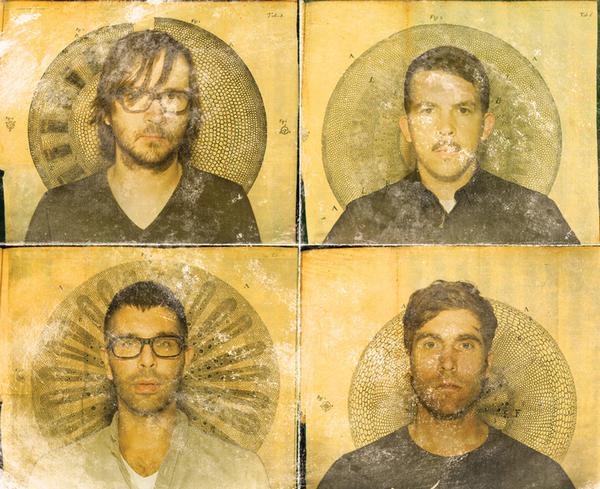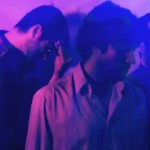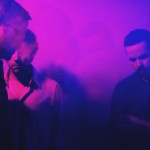By Arye Dworken
While just about every critic’s best-of list fawns over local indie rock heroes like Dirty Projectors and Grizzly Bear, self-titled took pleasure in discovering yet another Brooklyn-band-that-could, Bear In Heaven. The Southern transplants released their debut record (Red Bloom of the Boom, Hometapes) in 2007, but didn’t get any much-deserved attention until this year’s Beast Rest Fourth Mouth. (The blogosphere likes to attribute this delayed reaction to Grizzly Bear frontman Ed Droste, who championed the quartet on his now-defunct Twitter account.) The sophomore effort sounds like nothing else released this year, mostly because of Bear’s blatant prog-rock tendencies. In fact, throughout our conversation, names like Rush and Genesis are thrown about with genuine admiration.
But don’t let visions of Neal Peart’s drum kit deter you just yet–Bear In Heaven is more than capable of crafting four-minute anthems. Maybe that’s why Charlie Gibson name-checked them this fall…
Where are you guys originally from?
Joe: I’m from Alabama.
Jon: The three of us are from Atlanta.
Have you guys met Jews [like me] before?
Adam: Oh, yeah. There are Jews in Atlanta.
Joe: I’ve dated a few Jews.
Have you been in New York for a while?
Joe: This band started, with all of us together, about six years ago. The first record came out and we didn’t really know how to play with one another. It didn’t get the attention that the new one is getting.
Jon: We needed to make that record to get to where we are.
Adam: It was a lot proggier and weirder. We’re in a better place now, stylistically. But most of the songs on the new album:we’ve been playing them live for like three years. They shape-shifted live:
Jon: The songs found their identity with all the live shows. Like “Casual Goodbye†kept changing and changing and changing.
Adam: You should listen to the old record. It’s not all that different, really. The main difference is that all the songs are like seven minutes long. We realized that playing long songs are indulgent, especially when you play them live. Holding an audience’s attention for a full set of seven-minute songs:that isn’t easy.
Are you guys writing new stuff already?
Joe: I don’t think we’re quite ready to do that.
Jon: We take so much time with our ideas. We’re slow when it comes to finding these songs:
People are saying that there’s been a resurgence in experimental Brooklyn music, especially since all the bands of the early 2000’s went major label. Do you think you’re a part of that?
Adam: We’re friends with a lot of the guys on that list, but we don’t hang out with the guys on our downtime. We see them at shows, and say “hey,†and chat it up.
I saw that ABC segment that Pitchfork did. It was somewhat surreal seeing Charlie Gibson introduce the segment. There’s this observation about your music having a Southern influence:I don’t hear it.
Adam: Yeah, we’re confused about that. We did this interview the other day, and it was on some music blog, and they basically reworded the Pitchfork review, which references the Southern sound. The fact that we’re from Georgia and Alabama:I mean, we are proud Southerners, but it doesn’t influence our sound. And you know what? It was also a reference point on reviews for our last album. We don’t have guitar solos:how are we Southern rock? We are huge country music fans but there’s nothing there about that.
Jon: Maybe this is our opportunity to finally squash this allegation.
Let’s talk influences, then, like prog-rock from the ’70s, Rush…I mean that as a compliment.
Jon: Well, I think if you see our genesis… [Band laughs] Well, yes, now that I’ve brought up the capitol “G,†we do know a lot of prog-rock. Like I listen to a lot of Faust. I also come from a film background, so there are cinematic elements–narrative-driven music. I think that flavor is similar to the epic quality of film, or at least, I’m going for that. It kind of falls out that way.
Where you surprised by the reaction to the new album, especially considering the apathy around the first record?
Jon: Yes, absolutely. But I am truly proud of the record.
Adam: I listen to the record all the time. I’m trying to break it down and pick it apart for the live version. I want us to be a better live band.
How are you playing the music live?
Jon: People are generally surprised by our live show. I think the music truly makes sense in a live setting. That epic-ness that I was referring to:I hope that comes alive when we’re playing live in a room where the music is all around.
Joe: I also think that this record was more collaborative, so I think that translates in our organic connection.
Jon: People have told me, “Hey, I checked out your MySpace page and I was like, ‘Eh,’ but then I saw you live and I was like, ‘Wow.'” You know, they’re coming around.
How do you see the future now that you’re a higher profile band?
Adam: We’ll keep doing what we’ve already done. There is no intention to make our music sound different than anything else. In fact, “Casual Goodbye†sounds exactly like something from Stop Making Sense. We want to make songs that people can listen to and identify with.
Joe: I couldn’t be more anxious about recording a new record already.
Jon: We’ve got time to figure things out. Our record is coming out in Japan, but we haven’t really been approached by labels here in America.
Adam: We need to tour Europe.
Bear In Heaven has been around for a few years. How did you keep it together?
Adam: Well, we did almost break up once.
Joe: We played the night of the Biden/Palin debate and there was nobody there. It was really depressing. We weren’t angry but at one point, we thought enough was enough.
Jon: The mood was fucking dark. The forces were against us that night. Everybody wanted to stay home and watch Palin talk like a fucking hick.
Adam: But those days are behind us.
Joe: Yeah, now we get all the Palin fans showing up to our shows. So it’s all good.


